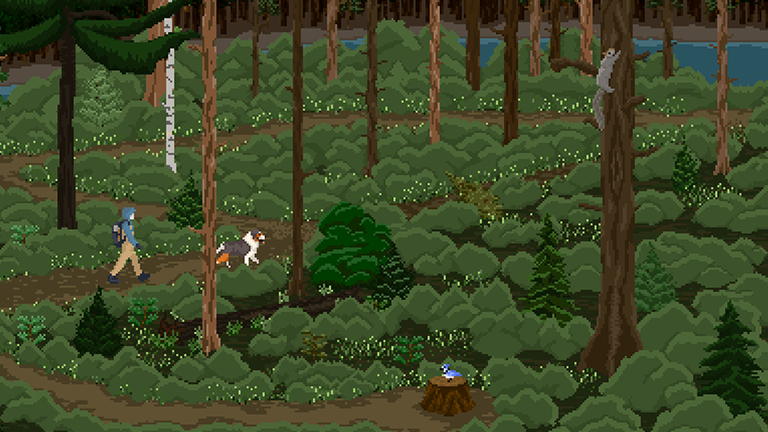
Jamie Blacknell is an alumnus and one of the people who made the Portage game (Adam really likes this game!!! It does look really cool though…) with Alex Pollard and Billy Spendlove.
Here’s a synopsis:
“A single player journey; on foot and in a canoe, through the Boreal forest with peaceful mechanics and aesthetics. Created to allow for mindful, individual experiences which highlight the calming aspects of nature. The player will be encouraged to take their time while reflecting on their surroundings and themselves. Wild encounters within the forest provide points of interest and bring life to the forest. Since the journey is not about the destination, nor are there any significant goals to achieve, the player will be able to focus on the present moment.”
Jamie’s Talk Notes
- He’s an in-house developer
- It’s better to be a Jack of All Trades, Master of None (Better than Master of one)
- Opportunity to use loads of different skills
Uni Preparation (How does the Uni prepare us?)
- Whole development pipeline
- Working independently and in teams
- Self-starting
- Taught to be proactive with research
Why was this Invaluable?
- Excellent crash course
- Taught how to communicate effectively
- Problem sole in key areas
What has changed since?
- Ability to specialise (in the field he wants, development)
- Communication challenges by being in new teams
Communication between colleagues of different levels
- Direct senior/Management
- Don’t over-explain what you’re doing
- Might have to translate, might not need to know or want to know what you’re doing
- Clear, concise and straight to the point
- Someone who doesn’t share your discipline
- Be specific with the desired outcome; don’t tell them to do their job
- They might need something from you
- Branch out of your own skill, try to learn their terminology, and be inquisitive
- Closes the gap in understanding
- Team Lead
- The easiest type of communication as you have the same knowledge
- No “translation” required. As with technical terms.
How University prepare for this?
- Working in teams the whole time
- People of different disciplines coming together
Portfolios
- Create things now – separate from your portfolio
- General portfolio advice
- Minimum: LinkedIn, portfolio, website
- Others: Instagram, GitHub, Art Station
Networking
- Rise of AI, networking is as important as ever
- Speak to real people, take part in game jams
- Learn who the big people are in the industry
- Learn about the artists in the media you like
- Ask seniors at studios for portfolios
Developer Portfolio
- Show your source code
- Github Portfolio
- Treat it like another project I’ve worked on
- Code KISS – keep it simple and standard
- Question if your code is maintainable
3D Artist Portfolio
- Artstation is a great place to be an artist
- Downside: There is a lot of competition
- Ideally, you want a pro account as it allows unlimited uploads
- Showcase that you can draw to a competent level
- Sketches, mood boards, photo bashing
- Take a concept and follow through with it
Artistic Ability
- Showcase you can work from a reference
- Show wire frames, UV layouts, poly counts, texture sizes, and texel density
- Understand optimisation like LODS (level of detail for meshes + textures) and mip map textures
- Showcase different texture maps
- Baking!!! Textures!!!
- Showing your artwork in different software is important
- In-engine screenshots
- Different Lighting Configs
- Unreal, Unity
- Learn one of these software programs
- Autodesk
- Zbrush
- Substance Painter
- Photoshop
- High-quality tutorials on Udemy, Gumroad, Artstation
Attention to Detail
- Details are important, but don’t add for the sake of it
- Think about how it fits with the pieces
- Think about the “context” of the model
Passion Pieces and presentations
- Avoid work you’re not interested in
- A handful of strong, well-presented pieces will stand out against 15 props
- Show inspiration, not plagiarism
Soft Skills
- Good communication
- Willingness to try
- Dedication + Hard Work
- Interviews
- Turn up presentable
- Dress appropriately
- Eye-contact
- The Uni encourages you to be self-starting
- Working in teams from Day 1
Truth And Rewards
- Competitive and challenging industry
- Deadlines can be tough, and communities can be unforgiving
- Rewarding
- You get to see the design to release
- Working with talented people
- Getting a community that values your work
My Question for Jamie
We had the opportunity to ask Jamie a question, and my question was, “Do you get imposter syndrome? If so, how do you cope with it?” Below are his answers:
- You wouldn’t be there if you weren’t good
- Communicate with teammates
- Don’t compare yourself to a higher or lower level
- It’s hard, but it will get easier
This helped me as I struggle with Imposter Syndrome a lot in my work, and hearing this advice from an industry professional was really helpful.